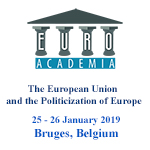Euroacademia Conferences
 Europe Inside-Out: Europe and Europeanness Exposed to Plural Observers (9th Edition) April 24 - 25, 2020
Europe Inside-Out: Europe and Europeanness Exposed to Plural Observers (9th Edition) April 24 - 25, 2020 Identities and Identifications: Politicized Uses of Collective Identities (9th Edition) June 12 - 13, 2020
Identities and Identifications: Politicized Uses of Collective Identities (9th Edition) June 12 - 13, 2020 8th Forum of Critical Studies: Asking Big Questions Again January 24 - 25, 2020
8th Forum of Critical Studies: Asking Big Questions Again January 24 - 25, 2020 Re-Inventing Eastern Europe (7th Edition) December 13 - 14, 2019
Re-Inventing Eastern Europe (7th Edition) December 13 - 14, 2019 The European Union and the Politicization of Europe (8th Edition) October 25 - 26, 2019
The European Union and the Politicization of Europe (8th Edition) October 25 - 26, 2019 Identities and Identifications: Politicized Uses of Collective Identities (8th Edition) June 28 - 29, 2019
Identities and Identifications: Politicized Uses of Collective Identities (8th Edition) June 28 - 29, 2019 The European Union and the Politicization of Europe (7th Edition) January 25 - 26, 2019
The European Union and the Politicization of Europe (7th Edition) January 25 - 26, 2019 7th Forum of Critical Studies: Asking Big Questions Again November 23 - 24, 2018
7th Forum of Critical Studies: Asking Big Questions Again November 23 - 24, 2018 Europe Inside-Out: Europe and Europeanness Exposed to Plural Observers (8th Edition) September 28 - 30, 2018
Europe Inside-Out: Europe and Europeanness Exposed to Plural Observers (8th Edition) September 28 - 30, 2018 Identities and Identifications: Politicized Uses of Collective Identities (7th Edition) June 14 - 15, 2018
Identities and Identifications: Politicized Uses of Collective Identities (7th Edition) June 14 - 15, 2018
The Public Realm and Contemplation in the Thought of Hannah Arendt and Jan Patočka
-
-

-
Presentation speakers
- Daniel Clements, Institute of Philosophy, KU Leuven, Belgium
Abstract:
Arendt and Patočka address history, philosophy, and the crisis of modern Europe with similar influences (chiefly Heidegger) and method, yet their understanding of how contemplation relates the European ideal of the public realm is incongruent. They both correlate closed systems of thought with closed societies and see the polis as a realm of free men, beyond necessity, unfixed and open-ended. They fault Plato for putting the ideal of the polis in crisis, a crisis which reached a fever pitch in the 20th Century. For Patočka, philosophy and politics are both rooted in polemos, the shaking of given sources of meaning. Once myth has ruptured, politics becomes a merely human realm of equals, just as for philosophy. There are no easy answers, the future is uncertain, ongoing discussion is needed, and one must have courage to risk themselves. The citizens of a polis are bound together by their common struggle, and the polis is the only context in which philosophy can take place. For Arendt, on the other hand, a life dedicated to contemplation is anti-social, demeans the vita activa (a term defines in context of “the trial of Socrates and the conflict between the philosopher and the polis”), depreciates man-made things (noting that the polis is a man-made thing), and is driven by a desire for quiet, stillness, and speechlessness (in other words, to be free from conflict and social interaction). This paper will explore their points of divergence in order to gain insight into the threat they believed the European ideal of the public realm was facing in the 20th century.
-
Related Presentations













